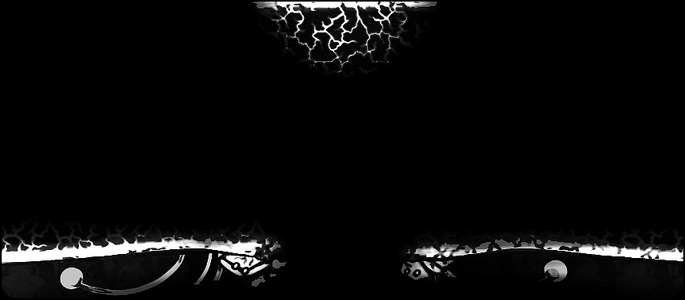Do you like puzzles? How about perception based puzzles? Now I have your attention. Closure is a puzzle game that was originally developed for the website Newgrounds. Recently, the indie developer, Eyebrow Interactive, has created a version for release on the PSN with a bunch more levels. Is Closure just some cheap, internet time waster, or will it shine bright on the PSN? Find out after the jump.
The gameplay in Closure is much like the puzzle game, Echochrome, where if you don’t see something then it doesn’t exist. Most of the levels are shrouded in dark, and if the player steps into the darkness, then they will fall and have to restart the puzzle. This goes for keys and other objects, as well. The player will have to manipulate light sources in order to navigate levels and solve the puzzles. There are some really cool implications of this gameplay style. First of all, everything has an air of mystery about it. Everything is in dark and you don’t really know what is in a level. Even with spotlights, handheld lights, and hanging lanterns, there will still be areas of a level that never get lit up, and so you never know what is over there. There are also static images in the background that can only be partially be seen by the player. Some provide atmosphere, while others give subtle clues about what to do next. This game is as much about learning your environment as it is solving the puzzles contained within in it. Now, it may seem like not being able to see a puzzle you are trying to solve would be a bad thing, but the game never gets frustrating. Sometimes, you might need to take a leap of faith or activate a platform just to see what it does, but I never found myself wandering around a level with no clue what I was supposed to be doing. The layout of the levels light sources, platforms, and other objects always give strong hints about where you should be and what you should be trying to do.
The difficulty and complexity of the game keep it interesting and engaging. Initially, it starts out very simple in order to give the player a feel for the game. Then it starts playing around with new types of light sources. Then it starts introducing levels that are harder to navigate, and then it will start introducing even more light sources. The game goes back and forth between introducing harder environments and introducing new light sources that the player will have to figure out how they work. Water also plays an important role with some objects that float and some objects that sink. The mechanics are all very simple, so getting accustomed to some new gameplay or light source doesn’t take much time. Eventually, you will need to get to the point where you will need to think about the puzzle as a whole and try to make connections between different parts of the puzzle. This is where the game really shines, and figuring out the relationship between two things that at first seem unrelated is very satisfying.
The game runs into some issues with collision detection and some of the jumping puzzles. Oftentimes, the player will be required to drop a key in a precarious position. Not only is it hard to tell exactly where the item will fall, but sometimes the key will fall off the edge when it seems it shouldn’t. It is also hard to tell how dropping items onto each other will affect them. Sometimes they push each other out of the way and sometimes they don’t. This could lead to some frustrating parts where the player keeps causing keys to fall off ledges. Jumping and getting close to edges also has its glitches. Much like the keys, sometimes the player will fall off an edge when it seems they shouldn’t. The game doesn’t require a lot of long distance jumping, so the issue doesn’t come up that much, but it is very frustrating when it does happen. Luckily, there is a quick reset button for when you screw up a puzzle.
The style and aesthetics of the game are simply amazing. Everything is in black and white and has a feel of being very dark and grimy. Lines shake and move around to make the entire level seem as if it is alive. The drawing style itself give the impression of some dystopian future created by Tim Burton. The music also fits really well, which mostly consists of drum beats and ambient noises.
Closure is one of those puzzle games that challenges a player and looks good while doing it. Like all great puzzle games, it follows the philosophy of “easy to learn, difficult to master.” Learning about the mechanics of the game is simple, and woven into the gameplay well enough that it is actually fun to learn about the game. Anyone who picks up this game will find hours of challenging gameplay, but ultimately a great sense of accomplishment that comes with any good puzzle game.
PlayStation LifeStyle’s Final Score
+ Aesthetics Are Amazing – Some Mechanics Are Clunky |
 |
–








